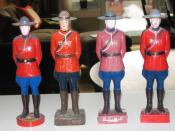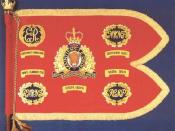"Disappointment and regret, yet acceptance of the Tribunal's decision, equity, and competence"ÃÂ, these were the words of Laurier, in response to the loss of the Alaskan Boundary Dispute. Canada's nationalism, its unity and diversity are the result of loss of land during the Alaskan Boundary Dispute of 1903. Although it was over land and possession, Canada's defeat of property played a key factor in bringing it together as a nation. When America bought Alaska from Russia, the boundaries of the Alaskan panhandle were not clearly defined, causing a dispute between Canada and America. A tribunal, consisting of three Americans, two Canadians and one British member, decided in favor of the U.S., thus the Alaskan panhandle was proclaimed American property. Theodore Roosevelt was said to have pressured all three American members, with his motto "speak softly and carry a big stick"ÃÂ , to rule in favor of the U.S. The British member had also been coerced in order to keep strong allies with America.
This caused controversy in the final decision, which outraged Canadians. This sense of anger and betrayal is what changed the governments views of its ties with the British and what started self-governance and Canadian nationalism. Although the tribunal ruled in favor of America in the Alaskan Boundary Dispute, and Canadians lost land, they gained something of true significance, the growth of nationalism.
Once the treaty was signed and America was granted the Alaskan panhandle, Canadian sentiments towards Britain and the US grew hostile. The tribunal had decided in favor of America due to various reasons. Britain had allied with the U.S. and betrayed Canada, causing a majority in the vote. The tribunal had also been manipulated in favor of the U.S. because the British member and the three American members had been instructed not to make any...


